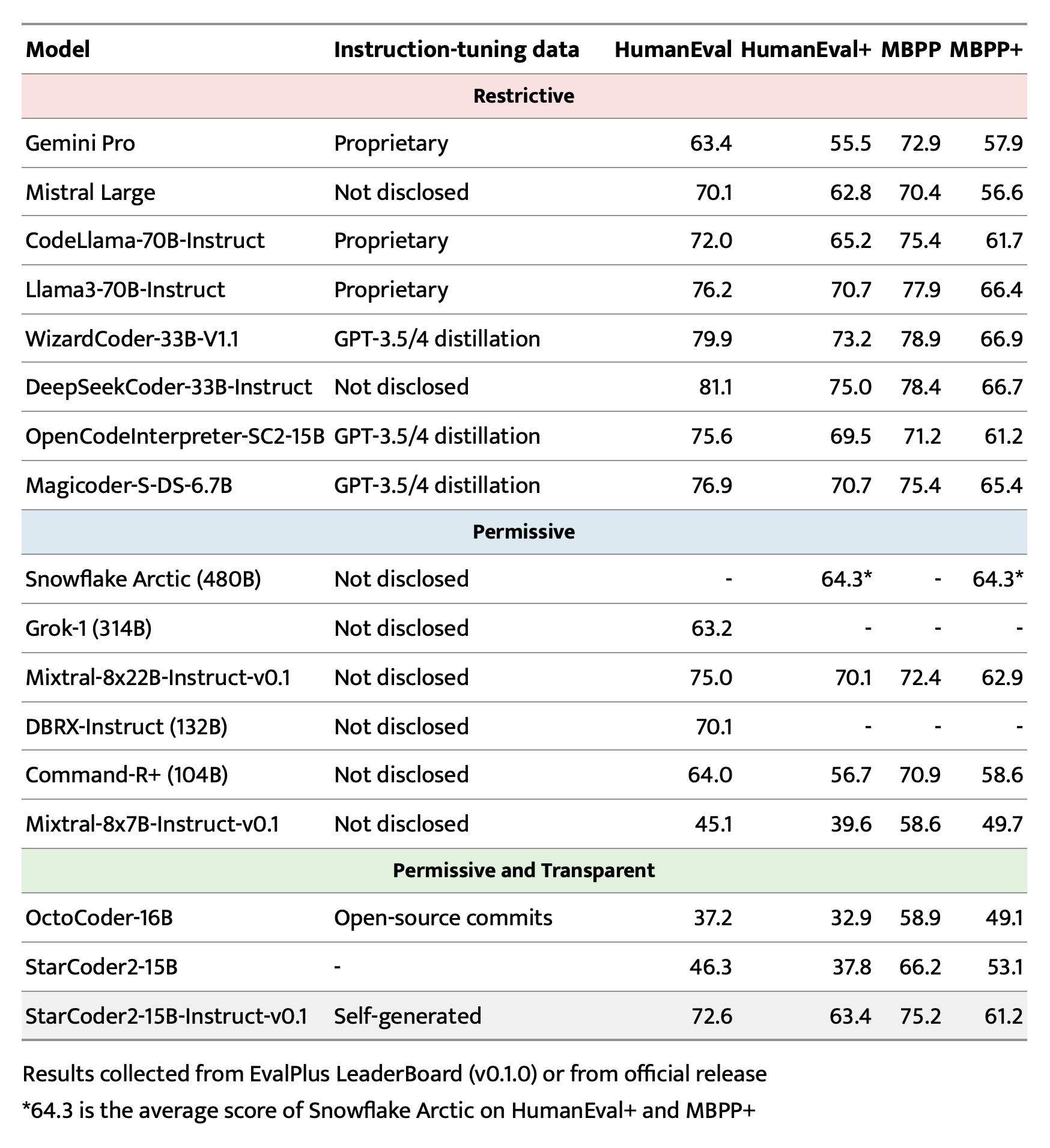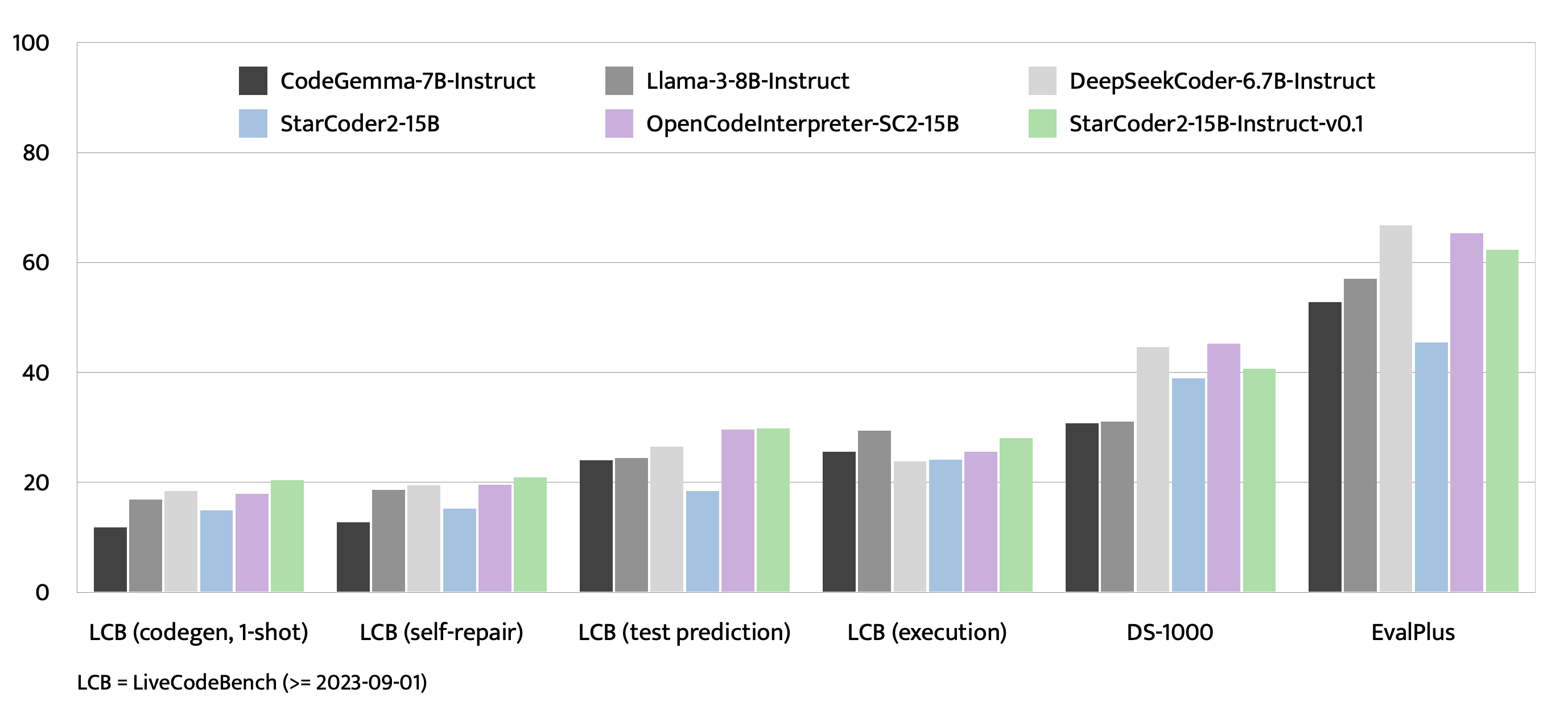pipeline_tag: text-generation
base_model: bigcode/starcoder2-15b
datasets:
- bigcode/self-oss-instruct-sc2-exec-filter-50k
license: bigcode-openrail-m
library_name: transformers
tags:
- code
model-index:
- name: starcoder2-15b-instruct-v0.1
results:
- task:
type: text-generation
dataset:
name: LiveCodeBench (code generation)
type: livecodebench-codegeneration
metrics:
- type: pass@1
value: 20.4
- task:
type: text-generation
dataset:
name: LiveCodeBench (self repair)
type: livecodebench-selfrepair
metrics:
- type: pass@1
value: 20.9
- task:
type: text-generation
dataset:
name: LiveCodeBench (test output prediction)
type: livecodebench-testoutputprediction
metrics:
- type: pass@1
value: 29.8
- task:
type: text-generation
dataset:
name: LiveCodeBench (code execution)
type: livecodebench-codeexecution
metrics:
- type: pass@1
value: 28.1
- task:
type: text-generation
dataset:
name: HumanEval
type: humaneval
metrics:
- type: pass@1
value: 72.6
- task:
type: text-generation
dataset:
name: HumanEval+
type: humanevalplus
metrics:
- type: pass@1
value: 63.4
- task:
type: text-generation
dataset:
name: MBPP
type: mbpp
metrics:
- type: pass@1
value: 75.2
- task:
type: text-generation
dataset:
name: MBPP+
type: mbppplus
metrics:
- type: pass@1
value: 61.2
- task:
type: text-generation
dataset:
name: DS-1000
type: ds-1000
metrics:
- type: pass@1
value: 40.6
StarCoder2-Instruct: Fully Transparent and Permissive Self-Alignment for Code Generation
Model Summary
We introduce StarCoder2-15B-Instruct-v0.1, the very first entirely self-aligned code Large Language Model (LLM) trained with a fully permissive and transparent pipeline. Our open-source pipeline uses StarCoder2-15B to generate thousands of instruction-response pairs, which are then used to fine-tune StarCoder-15B itself without any human annotations or distilled data from huge and proprietary LLMs.
- Model: bigcode/starcoder2-15b-instruct-v0.1
- Code: bigcode-project/starcoder2-self-align
- Dataset: bigcode/self-oss-instruct-sc2-exec-filter-50k
- Authors: Yuxiang Wei, Federico Cassano, Jiawei Liu, Yifeng Ding, Naman Jain, Harm de Vries, Leandro von Werra, Arjun Guha, Lingming Zhang.
Use
Intended use
The model is designed to respond to coding-related instructions in a single turn. Instructions in other styles may result in less accurate responses.
Here is an example to get started with the model using the transformers library:
import transformers
import torch
pipeline = transformers.pipeline(
model="bigcode/starcoder2-15b-instruct-v0.1",
task="text-generation",
torch_dtype=torch.bfloat16,
device_map="auto",
)
def respond(instruction: str, response_prefix: str) -> str:
messages = [{"role": "user", "content": instruction}]
prompt = pipeline.tokenizer.apply_chat_template(messages, tokenize=False)
prompt += response_prefix
teminators = [
pipeline.tokenizer.eos_token_id,
pipeline.tokenizer.convert_tokens_to_ids("###"),
]
result = pipeline(
prompt,
max_length=256,
num_return_sequences=1,
do_sample=False,
eos_token_id=teminators,
pad_token_id=pipeline.tokenizer.eos_token_id,
truncation=True,
)
response = response_prefix + result[0]["generated_text"][len(prompt) :].split("###")[0].rstrip()
return response
instruction = "Write a quicksort function in Python with type hints and a 'less_than' parameter for custom sorting criteria."
response_prefix = ""
print(respond(instruction, response_prefix))
Here is the expected output:
Here's how you can implement a quicksort function in Python with type hints and a 'less_than' parameter for custom sorting criteria:
```python
from typing import TypeVar, Callable
T = TypeVar('T')
def quicksort(items: list[T], less_than: Callable[[T, T], bool] = lambda x, y: x < y) -> list[T]:
if len(items) <= 1:
return items
pivot = items[0]
less = [x for x in items[1:] if less_than(x, pivot)]
greater = [x for x in items[1:] if not less_than(x, pivot)]
return quicksort(less, less_than) + [pivot] + quicksort(greater, less_than)
```
Bias, Risks, and Limitations
StarCoder2-15B-Instruct-v0.1 is primarily finetuned for Python code generation tasks that can be verified through execution, which may lead to certain biases and limitations. For example, the model might not adhere strictly to instructions that dictate the output format. In these situations, it's beneficial to provide a response prefix or a one-shot example to steer the model’s output. Additionally, the model may have limitations with other programming languages and out-of-domain coding tasks.
The model also inherits the bias, risks, and limitations from its base StarCoder2-15B model. For more information, please refer to the StarCoder2-15B model card.
Evaluation on EvalPlus, LiveCodeBench, and DS-1000
Training Details
Hyperparameters
- Optimizer: Adafactor
- Learning rate: 1e-5
- Epoch: 4
- Batch size: 64
- Warmup ratio: 0.05
- Scheduler: Linear
- Sequence length: 1280
- Dropout: Not applied
Hardware
1 x NVIDIA A100 80GB
Resources
- Model: bigcode/starCoder2-15b-instruct-v0.1
- Code: bigcode-project/starcoder2-self-align
- Dataset: bigcode/self-oss-instruct-sc2-exec-filter-50k
Full Data Pipeline
Our dataset generation pipeline has several steps. We provide intermediate datasets for every step of the pipeline:
- Original seed dataset filtered from The Stack v1: https://huggingface.co/datasets/bigcode/python-stack-v1-functions-filtered
- Seed dataset filtered using StarCoder2-15B as a judge for removing items with bad docstrings: https://huggingface.co/datasets/bigcode/python-stack-v1-functions-filtered-sc2
- seed -> concepts: https://huggingface.co/datasets/bigcode/self-oss-instruct-sc2-concepts
- concepts -> instructions: https://huggingface.co/datasets/bigcode/self-oss-instruct-sc2-instructions
- instructions -> response: https://huggingface.co/datasets/bigcode/self-oss-instruct-sc2-responses-unfiltered
- Responses filtered by executing them: https://huggingface.co/datasets/bigcode/self-oss-instruct-sc2-exec-filter-500k-raw
- Executed responses filtered by deduplicating them (final dataset): https://huggingface.co/datasets/bigcode/self-oss-instruct-sc2-exec-filter-50k



